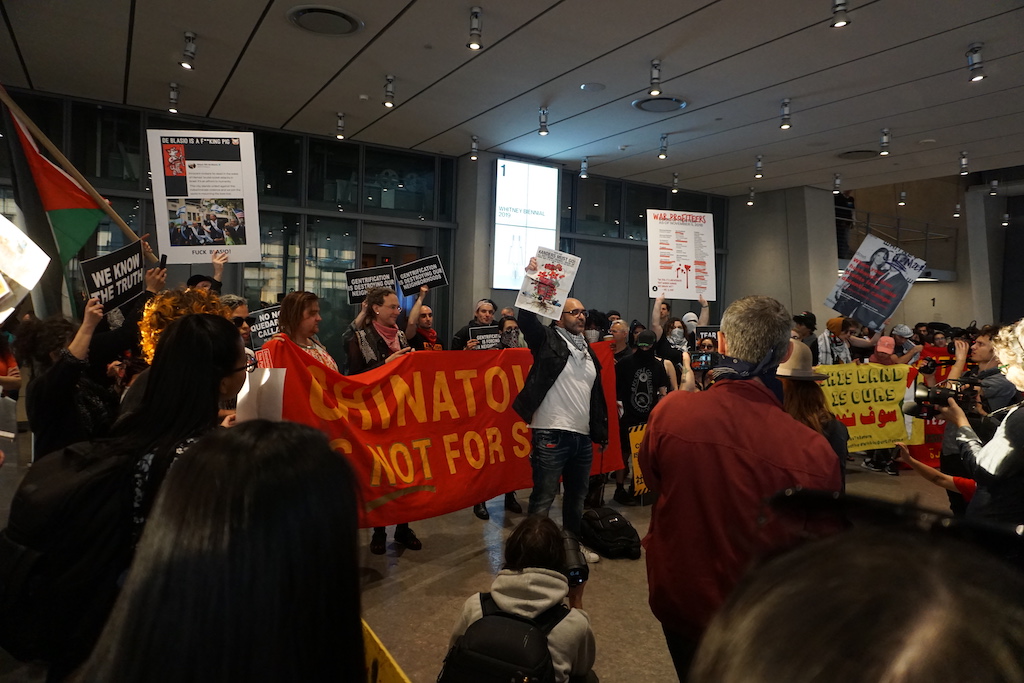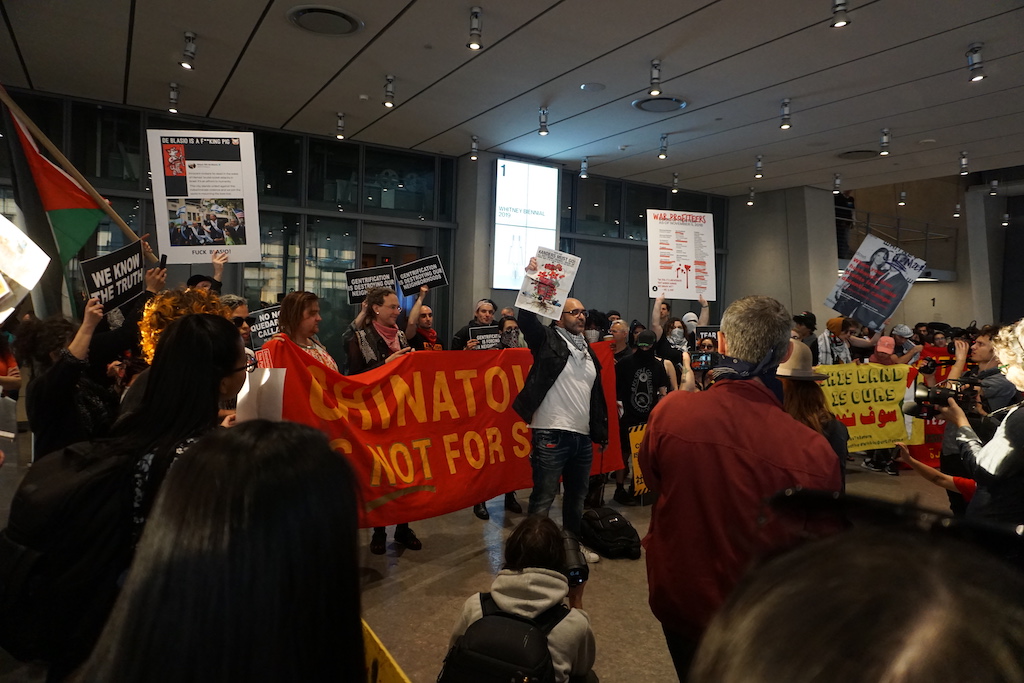[ad_1]

Protesters at a Decolonize This Place action at the Whitney Museum in New York on May 17, 2019.
ALEX GREENBERGER/ARTNEWS
Four participants in the Whitney Biennial have called on the institution to remove their work from the show, citing the museum’s continued involvement with Warren B. Kanders, its vice-chair, who is the owner of a company that manufactures teargas canisters and other products used against protestors around the world.
The four artists—Korakrit Arunanondchai, Meriem Bennani, Nicole Eisenman, and Nicholas Galanin—made their call in a letter addressed to the biennial’s curators, Rujeko Hockley and Jane Panetta, that was published by Artforum on Friday morning.
“We were angry when we learned of Kanders’ role as CEO of Safariland, a company that manufactures teargas and other weapons of repression,” the artists write. “At the time, we had already accepted your invitation to participate in the Whitney Biennial and some of us were well into fabrication of major pieces for this show. We found ourselves in a difficult position: withdraw in protest or stay and abide a conflicted conscience. We decided to participate.”
In a statement, Adam Weinberg, the Whitney’s director, said, “The Whitney respects the opinions of all the artists it exhibits and stands by their right to express themselves freely. While the Whitney is saddened by this decision, we will of course comply with the artists’ request.”
The Biennial is scheduled to run through September 22.
Since the biennial opened in mid-May, no other artists have asked the museum to pull their art from the show. When the artist list was announced, the New York Times reported that Michael Rakowitz had declined to participate in the exhibition because of the Whitney’s connections to Kanders. One participant—Forensic Architecture—explicitly deals in its work with Kanders’s ownership of Safariland, a defense manufacturing company that has been accused of selling tear-gas canisters that have been thrown at asylum seekers along the U.S.-Mexico border and at protesters in Ferguson, the Gaza Strip, Turkey, and elsewhere.
“We are the first five of hopefully many to reject the museums inert approach to a serious issue that effects all of our communities,” Galanin told ARTnews in an email. “Does the Whitney want to be complacent in the violence and treatment of people of color in New York City, on our shared boarders, and abroad? Do these institutions exist to amplify the artists thoughts and perspectives while educating community? Is the Whitney able to do this and bring our community together while neglecting to speak to the violence happening now, or is this something they will proudly celebrate and show in 20 years’ time from a position they have failed to take today. Refusal to take a stand is complacency, especially when you are an Americas Institution with so much influence and voice.”
The controversy surrounding Kanders began late last year, after Hyperallergic first reported on the use of Safariland products along the U.S.-Mexico border. Nearly 100 Whitney staff members penned a letter to leadership at the museum in which they demanded that the institution consider asking for his resignation. Weinberg said in a response that employees should start a conversation, and Kanders said that he was “not the problem.”
[See a complete timeline of the Kanders controversy.]
Since December, the activist group Decolonize This Place has repeatedly protested Kanders’s position on the Whitney’s board, leading a series of nine protests earlier this year that culminated in an action in May, during the week of the Biennial’s opening, that included a march to Kanders’s house in New York’s West Village neighborhood. W.A.G.E., Indigenous Womxn’s Collective, and other groups have also protested against Kanders.
The open letter comes just days after Artforum published “The Tear Gas Biennial,” an essay written by Hannah Black, Ciarán Finlayson, and Tobi Haslett in which the authors encouraged Whitney Biennial participants to pull their work from the show. “We have heard that it would be impossible to remove Kanders; everything is impossible before it happens,” they write.
All four of the Artforum letter’s writers had previously signed a letter put out by the Brooklyn-based publisher Verso Books. The Verso letter also called on Kanders to resign, and was signed by nearly half of the biennial’s participants, as well as more than 100 academics, critics, artists, and writers.
[ad_2]
Source link

